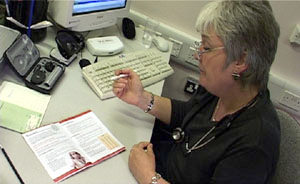Background
What is the problem?
Why bother creating a booklet on respiratory tract infections? Is there a problem?
As
a GP or practice nurse, you will be more than aware that most
respiratory tract infections (RTIs) in children are self-limiting
illnesses. So why is the most common problem seen by GPs often described
as a frustrating experience? And why do parents often report feeling
“fobbed off”, and leave these consultations feeling dissatisfied?
 Antibiotic
use is certainly a part of it. GPs often feel caught between pressure
from above to not prescribe and expectations from parents to prescribe.
However, there is evidence that GPs often overestimate parents’
expectations for antibiotics, and that many parents, when they are fully
informed about the modest benefits and potential harms from treatment,
would rather avoid giving them.
Antibiotic
use is certainly a part of it. GPs often feel caught between pressure
from above to not prescribe and expectations from parents to prescribe.
However, there is evidence that GPs often overestimate parents’
expectations for antibiotics, and that many parents, when they are fully
informed about the modest benefits and potential harms from treatment,
would rather avoid giving them.
Antibiotic resistance has been
recognised as a major public health concern by the World Health
Organisation and the UK government. It has been estimated that 80% of
all antibiotics are prescribed in the community, and that 50% of these
are probably unnecessary, and in the UK, this has led the government’s
Standing Medical Advisory Committee to recommended rationalising
antibiotic prescribing in primary care as a key component in the battle
against resistance.
The problem of antimicrobial resistance is
not just a societal problem or a problem for future generations. Recent
research has shown that patients who have recently had an antibiotic
prescription for a RTI are more likely to have a resistant urinary tract
infection (UTI), and that resistant UTIs are common in primary care and
are symptomatic for longer and increase primary care workload.